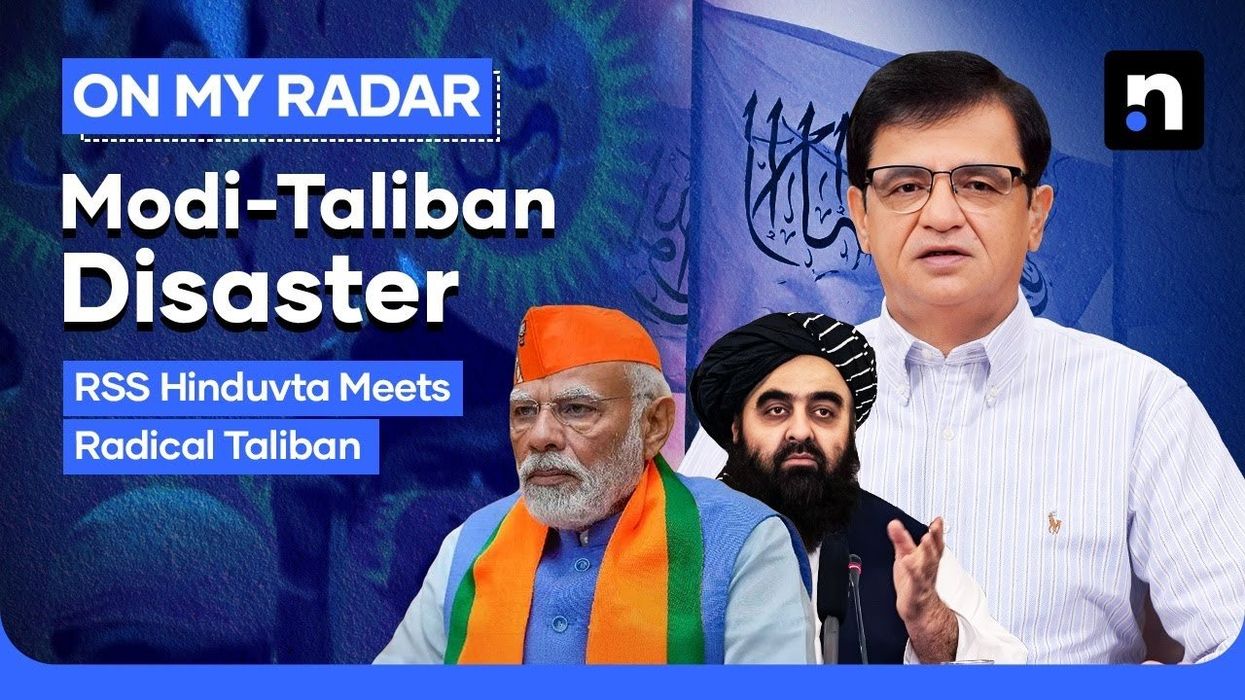Taliban FM’s India visit backfires as Modi faces outrage over women’s rights row
Kamran Khan says Modi’s Taliban outreach has backfired as India erupts over women’s rights
News Desk
The News Desk provides timely and factual coverage of national and international events, with an emphasis on accuracy and clarity.
Kamran Khan says India’s attempt to rebrand the Afghan Taliban as diplomatic partners has badly backfired, leaving Prime Minister Narendra Modi’s government facing unprecedented domestic outrage.
Over the past week, Indian media, opposition parties, and civil society have sharply criticized the Modi administration for hosting Afghan Foreign Minister Amir Khan Muttaqi in New Delhi — a visit that quickly turned into a public relations disaster.
Khan says Modi’s government appeared to have shifted its stance overnight, moving from calling the Taliban “bad” to treating them as “good.” India not only extended full diplomatic protocol to Muttaqi but also upgraded its Kabul technical mission to an embassy-level presence.
Despite that gesture, Khan notes, Muttaqi’s visit became a humiliation for both sides. “Amir Khan Muttaqi was subjected to the kind of media grilling no visiting foreign minister has likely ever faced in India,” he said, adding that Modi’s government was now facing fierce criticism for compromising on women’s rights and democratic principles.
During the visit, Muttaqi’s first press conference in New Delhi triggered outrage after his team barred female journalists from attending, allowing only 16 male reporters into the Afghan Embassy.
The exclusion sparked nationwide condemnation, with opposition leaders accusing Modi of betraying Indian women. Congress General Secretary Priyanka Gandhi said Modi’s silence sent a “message of weakness” to every woman in India, while Rahul Gandhi wrote that hosting a men-only press event showed the government’s moral bankruptcy.
Under mounting backlash, Muttaqi was forced to hold a second press conference within 48 hours — this time inviting women journalists, who sat in front rows and asked tough questions. Muttaqi later claimed the earlier exclusion was due to a “technical issue,” though few in India appeared convinced.
Khan points out the irony: “This clarification came from a minister representing a government that has barred millions of Afghan girls from schools and universities and restricted women’s employment.”
Indian commentators, Khan adds, see Modi’s move as a dangerous precedent. Veteran journalist Ravish Kumar questioned whether “the same media that once condemned the Taliban will now shape India’s foreign policy,” while poet and activist Javed Akhtar said he was “ashamed” to see India roll out the red carpet for “the world’s worst oppressors.”
Akhtar told senior anchor Rajdeep Sardesai that the Taliban’s treatment of women amounted to “inhuman cruelty” and asked whether such people deserved respect from the world’s largest democracy.
Even within Modi’s camp, confusion was visible. The Indian Foreign Ministry appeared hesitant throughout the visit. Photos of Muttaqi and Indian Foreign Minister S. Jaishankar standing together showed no flags behind them — an apparent attempt to avoid visual symbolism of recognition.
Muttaqi’s engagements, however, were far from limited to official diplomacy. He visited Darul Uloom Deoband — a historic Islamic seminary that inspired the Taliban’s ideology — where he received a warm welcome. Earlier, he also attended an event at the Vivekananda International Foundation, a think tank linked to the Hindu nationalist RSS.
Khan says the dual visits — to both a hardline Hindu organization and an Islamic seminary — have placed Deoband’s reputation for moderation under strain. “By meeting both ends of India’s ideological spectrum, Muttaqi may have deepened the Taliban’s image problem rather than repaired it,” he observed.
Former Jammu and Kashmir Chief Minister Mehbooba Mufti also criticized the government, saying Modi was once calling the Taliban terrorists and is now eager to negotiate with them.
For Khan, the episode reflects a deep contradiction in India’s evolving regional policy. “New Delhi is trying to use the Taliban as a counterweight to Pakistan,” he explained, “but by doing so, it risks normalizing an extremist system that could threaten its own values and security.”
He reminds viewers that this is not the first time the Taliban have featured in India’s political drama. In December 1999, when an Indian Airlines flight was hijacked to Kandahar, the Taliban — then in power — helped broker the release of militants like Masood Azhar in exchange for hostages. “One of the facilitators at the airport back then was none other than Amir Khan Muttaqi,” Khan recalled.
More than two decades later, India’s relationship with the Taliban has come full circle. But, Khan warns, “political ties built on opportunism and shared hostility toward a third country rarely last. The day may not be far when today’s ‘good Taliban’ once again become ‘bad Taliban’ in India’s eyes.”











Comments
See what people are discussing